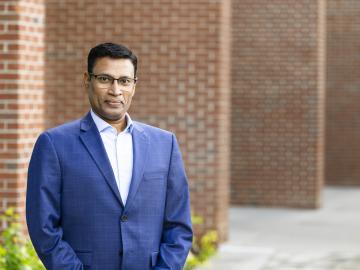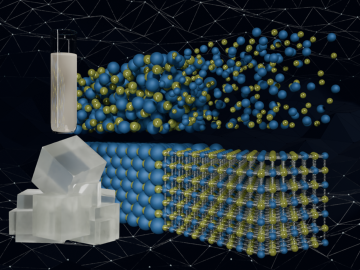
Filter News
Area of Research
- Advanced Manufacturing (1)
- Biology and Environment (47)
- Computational Biology (1)
- Computational Engineering (3)
- Computer Science (3)
- Energy Science (86)
- Fusion and Fission (8)
- Fusion Energy (7)
- Isotope Development and Production (1)
- Isotopes (7)
- Materials (41)
- Materials for Computing (9)
- Mathematics (1)
- National Security (9)
- Neutron Science (14)
- Nuclear Science and Technology (11)
- Nuclear Systems Modeling, Simulation and Validation (1)
- Supercomputing (28)
- Transportation Systems (2)
News Type
News Topics
- (-) Advanced Reactors (27)
- (-) Big Data (37)
- (-) Biomedical (41)
- (-) Chemical Sciences (57)
- (-) Coronavirus (34)
- (-) Irradiation (2)
- (-) Molten Salt (8)
- (-) Transportation (74)
- 3-D Printing/Advanced Manufacturing (95)
- Artificial Intelligence (60)
- Bioenergy (65)
- Biology (74)
- Biotechnology (21)
- Buildings (46)
- Clean Water (23)
- Composites (26)
- Computer Science (119)
- Critical Materials (25)
- Cybersecurity (26)
- Education (3)
- Element Discovery (1)
- Emergency (1)
- Energy Storage (88)
- Environment (126)
- Exascale Computing (17)
- Fossil Energy (2)
- Frontier (20)
- Fusion (35)
- Grid (45)
- High-Performance Computing (55)
- Hydropower (8)
- Isotopes (38)
- ITER (6)
- Machine Learning (37)
- Materials (105)
- Materials Science (105)
- Mathematics (8)
- Mercury (9)
- Microelectronics (1)
- Microscopy (39)
- Nanotechnology (47)
- National Security (38)
- Neutron Science (91)
- Nuclear Energy (63)
- Partnerships (35)
- Physics (46)
- Polymers (28)
- Quantum Computing (19)
- Quantum Science (48)
- Security (20)
- Simulation (27)
- Space Exploration (13)
- Statistics (2)
- Summit (32)
Media Contacts

Strengthening the competitiveness of the U.S. transportation industry depends on developing domestic EV batteries that combine rapid charging with long-range performance — two goals that often conflict. Researchers at ORNL have addressed this challenge by redesigning a key battery component, enabling fast, 10-minute charging while improving energy density and reducing reliance on copper.

From decoding plant genomes to modeling microbial behavior, computational biologist Priya Ranjan builds computational tools that turn extensive biological datasets into real-world insights. These tools transform the way scientists ask and answer complex biological questions that advance biotechnology breakthroughs and support cultivation of better crops for energy and food security.

Scientists have developed a new machine learning approach that accurately predicted critical and difficult-to-compute properties of molten salts, materials with diverse nuclear energy applications.

Analyzing massive datasets from nuclear physics experiments can take hours or days to process, but researchers are working to radically reduce that time to mere seconds using special software being developed at the Department of Energy’s Lawrence Berkeley and Oak Ridge national laboratories.

Jesse Labbé aims to leverage biology, computation and engineering to address societal challenges related to energy, national security and health, while enhancing U.S. competitiveness. Labbé emphasizes the importance of translating groundbreaking research into practical applications that have real-world impact.
Dave Weston studies how microorganisms influence plant health and stress tolerance, using the Advanced Plant Phenotyping Laboratory to accelerate research on plant-microbe interactions and develop resilient crops for advanced fuels, chemicals and
Scientists at ORNL have developed a method that can track chemical changes in molten salt in real time — helping to pave the way for the deployment of molten salt reactors for energy production.

By editing the polymers of discarded plastics, ORNL chemists have found a way to generate new macromolecules with more valuable properties than those of the starting material.

P&G is using simulations on the ORNL Summit supercomputer to study how surfactants in cleaners cause eye irritation. By modeling the corneal epithelium, P&G aims to develop safer, concentrated cleaning products that meet performance and safety standards while supporting sustainability goals.

Ryan Culler is the program manager at Oak Ridge National Laboratory, where he oversees the production of actinium-225, a promising treatment for cancer. Driven by a personal connection to cancer through his late brother, Culler is dedicated to advancing medical isotopes to help improve cancer care.


